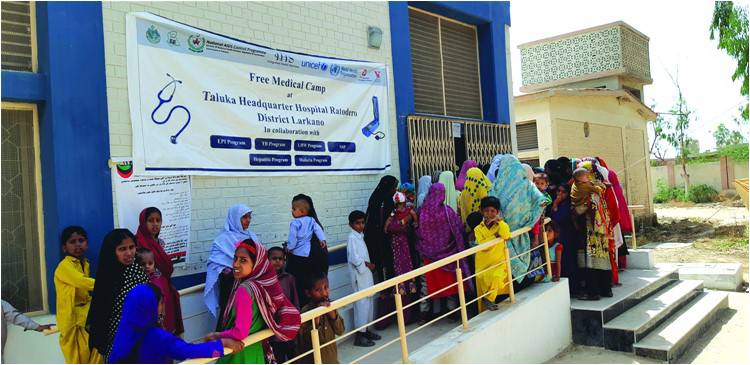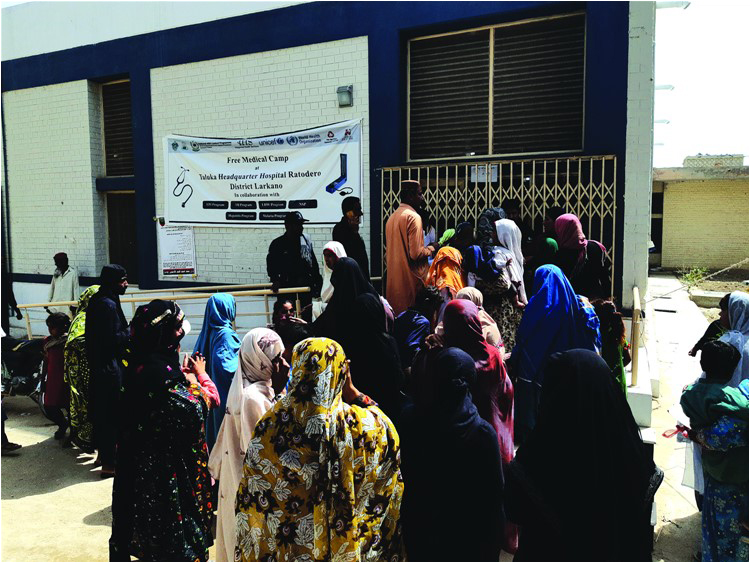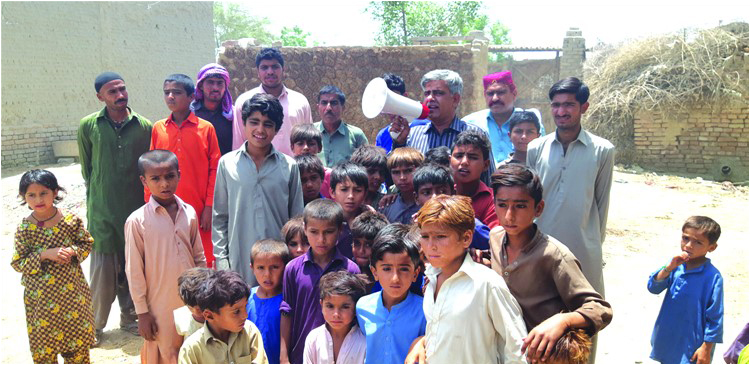
Larkana’s Ratodero town is known for the Bhuttos’ political legacy. From Zulfikar Ali Bhutto and Benazir Bhutto to the current Pakistan Peoples’ Party (PPP) leadership of Chairman Bilawal Bhutto Zardari and his party influential aunt Faryal Talpur, it has been an ancestral electoral constituency. But last month, Ratodero made global headlines for a different reason – when all of a sudden, new HIV positive cases erupted. Also a Dr. Muzaffar Ghanghro – a local HIV-positive pediatrician – was arrested on suspicion of spreading Aids by reusing syringes at his clinic!
Since the first reported case of the ongoing outbreak of HIV/AIDS in Ratodero sub-division during the last week of April 2019, over 21,000 people were screened. Official records say as many as 681 people – of which 537 were children from 2 to 12 years of age – have been tested positive for HIV (until filing of this story).
As the news spread, the panic button was switched on for the Ratodero locals and surrounding areas. Locals, including women and children from surrounding areas thronged into the Ratodero Taluka Hospital to get checked for the virus. This is an unusual practice in rural areas like Ratodero where even discussing HIV/AIDS is a taboo.

“To cater the visitors, we have established make-shift tent camp inside hospital,” Dr Ramesh Lal Shetiya, Medical Supertident Taluka Hospital Ratodero tells The Friday Times. Also some additional camps have been established in the area at a Union Council level so that people can get screened closer to their residences.
Fear has spread from Ratodero town to surrounding areas.
After 21 cases of HIV were confirmed from Allah Dino Seelro – a village of 3,000 inhabitants situated some three kilometres from Ratodero, outsiders have stopped visiting the village at all.
Hazar Khan Seelro, 70-year-old resident of the Allah Dino Seelro village is head of the house from where 5 fresh HIV cases were tested positive. Eight months ago, his 35-year-old married daughter and a grandson died due to AIDS.
“Outsiders and villagers have stopped visiting us. They even do not have a meal with us. Some also avoid handshakes with us,” Hazar says.
Another villager Ghulam Allah Seelro says that neighbours make sure that affected persons wear fully covering clothes so that HIV may not be transmitted through mosquito bites.
***
During the visit to Allah Dino Seelro by this scribe, Liaquat Mirani, a local social and political activist, is seen making announcements on the megaphone – going door to door and appealing to villagers to take some basic steps to avoid infections. From street to street, he moves like the Pied Piper, and locals including children follow him. Some women watch the crowd at their doorstep and some trepidation is visible on their faces. This scenario is new for them.
Mirani tells villagers to avoid injections while they visit the doctor. “Please don’t insist that doctors use injections or an IV drip. Instead, ask for tablets and capsules,” he tells them.
He is very vocal on safe sex – a topic that is taboo in a society like Allah Dino Seelro village.

“When husband and wife meet, they must use condoms. Without condoms, sex could be harmful,” he announces.
In a Shah Baksh Brohi, another village 20 kilometres away from Ratodero, a HIV positive mother has stopped feeding her newborn non-HIV baby. She suspects that virus was transmitted through a surgical operation held one year ago. She has handed over the baby to her sister to look after it and feed it.
In the same village people have purchased razor machines so that they can give their children haircuts at home rather than sending them to the barber shops.
Human immunodeficiency virus (HIV) is a virus that targets and alters the immune system, increasing the risk and impact of other infections and diseases. Without treatment, the infection might progress to an advanced stage called AIDS (acquired immunodeficiency syndrome).
HIV most often spreads through unprotected sex with a person who has it. It may also spread by sharing hypodermic needles or through contact with the blood of a person who has HIV.
According to official estimates, there are 150,000 HIV-positive patients in Pakistan: 75,000 in Punjab; 60,000 in Sindh and 15,000 in Khyber-Pakhtunkhwa and Balochistan.
The recent spate of HIV cases emerged when on the 22nd of April, a child suffering from high fever visited the clinic of Dr Imran Arbani – a private practitioner in Ratodero. He suggested an HIV test and the child was confirmed HIV positive. In the next few days the number rose to 15.
This was the start of a media spotlight on the situation.
In the initial investigation, local media reported that a majority of the children who were tested HIV positive were previously treated in another Ratodero clinic run by Dr Muzaffar Ghangharo. Later a team of the Sindh Health Department visited Dr Ghangharo’s clinic and found that pediatrician was himself HIV positive.
Authorities are investigating whether Dr Ghangharo infected anybody intentionally or recklessly. From lockup, Dr Ghangharo denies the accusations via a video. He also says that he was unaware that he was HIV positive.
To investigate and control the epidemic, a joint investigation team has been formed that includes representatives of Sindh AIDS Control Programme and related officials.
Larkana police have started a crackdown on brothels. Senior Superintendent of Police (SSP) Larkana Masood Bangash notes that police have closed down “several” brothels. “We have told members of the transgender community that we don’t want to see them working the streets or dancing at weddings anymore,” he says.
On the request of the federal government, a team of World Health Organization (WHO) experts visited Pakistan to investigate the outbreak of HIV in the affected area of Larkana.
Pakistan Peoples’ Party (PPP) chairman Bilawal Bhutto Zardari has directed the Sindh government to establish an endowment fund for treatment of HIV patients so that lifelong and free-of-cost treatment could be provided. He has also hinted at a new bill to tackle the HIV/AIDS problem.
But Dr Imran Arbani raises questions on the Sindh government’s handling of the situation. He thinks the Sindh government was concealing the actual number of HIV positive cases.
“Since the last week of April, over 100 cases of ailing children that I sent ahead for laboratory analysis tested HIV positive. If over 100 patients coming to just one clinic may be diagnosed with HIV then why, despite all the media coverage, has the entire system of the Sindh government so far confirmed 700 cases? I believe the real number could be in thousands,” says Arbani.
“To hide the cases they are declaring positive cases as false positive cases. I have 10 cases that Sindh Aids Control Program has declared negative but when tested from the Agha Khan laboratory they were declared positive. I believe Sindh government is mercy killing the HIV positive cases,” says Arbani.
To address the spread of life-threatening illnesses and stop the reuse of single-use disposable syringes, the Sindh Government passed a bill to regulate the use of disposable syringes in 2011. According to law, “no person shall manufacture, sell or use disposable syringes other than auto lock, auto destruct or auto break for injection, drawing of blood and other purposes.”
However experts have stressed more on the implementation of existing laws. They believe existing legislation can cover the major sources of HIV. Dr Qaiser Sajjad, Secretary General of the Pakistan Medical Association (PMA) points out:
“The reuse of syringes, for instance, is banned in Sindh – but there is hardly any implantation. There is hardly any check and balance on instruments used in barber shops and beauty parlours – which can cause transmission of HIV.
Zulfiqar Kunbhar is a Karachi-based environmental journalist. He tweets @ZulfiqarKunbhar
Since the first reported case of the ongoing outbreak of HIV/AIDS in Ratodero sub-division during the last week of April 2019, over 21,000 people were screened. Official records say as many as 681 people – of which 537 were children from 2 to 12 years of age – have been tested positive for HIV (until filing of this story).
As the news spread, the panic button was switched on for the Ratodero locals and surrounding areas. Locals, including women and children from surrounding areas thronged into the Ratodero Taluka Hospital to get checked for the virus. This is an unusual practice in rural areas like Ratodero where even discussing HIV/AIDS is a taboo.

“To cater the visitors, we have established make-shift tent camp inside hospital,” Dr Ramesh Lal Shetiya, Medical Supertident Taluka Hospital Ratodero tells The Friday Times. Also some additional camps have been established in the area at a Union Council level so that people can get screened closer to their residences.
Fear has spread from Ratodero town to surrounding areas.
After 21 cases of HIV were confirmed from Allah Dino Seelro – a village of 3,000 inhabitants situated some three kilometres from Ratodero, outsiders have stopped visiting the village at all.
Hazar Khan Seelro, 70-year-old resident of the Allah Dino Seelro village is head of the house from where 5 fresh HIV cases were tested positive. Eight months ago, his 35-year-old married daughter and a grandson died due to AIDS.
Official records say as many as 681 people – of which 537 were children from 2 to 12 years of age – have been tested positive for HIV
“Outsiders and villagers have stopped visiting us. They even do not have a meal with us. Some also avoid handshakes with us,” Hazar says.
Another villager Ghulam Allah Seelro says that neighbours make sure that affected persons wear fully covering clothes so that HIV may not be transmitted through mosquito bites.
***
During the visit to Allah Dino Seelro by this scribe, Liaquat Mirani, a local social and political activist, is seen making announcements on the megaphone – going door to door and appealing to villagers to take some basic steps to avoid infections. From street to street, he moves like the Pied Piper, and locals including children follow him. Some women watch the crowd at their doorstep and some trepidation is visible on their faces. This scenario is new for them.
Mirani tells villagers to avoid injections while they visit the doctor. “Please don’t insist that doctors use injections or an IV drip. Instead, ask for tablets and capsules,” he tells them.
He is very vocal on safe sex – a topic that is taboo in a society like Allah Dino Seelro village.

“When husband and wife meet, they must use condoms. Without condoms, sex could be harmful,” he announces.
In a Shah Baksh Brohi, another village 20 kilometres away from Ratodero, a HIV positive mother has stopped feeding her newborn non-HIV baby. She suspects that virus was transmitted through a surgical operation held one year ago. She has handed over the baby to her sister to look after it and feed it.
In the same village people have purchased razor machines so that they can give their children haircuts at home rather than sending them to the barber shops.
Human immunodeficiency virus (HIV) is a virus that targets and alters the immune system, increasing the risk and impact of other infections and diseases. Without treatment, the infection might progress to an advanced stage called AIDS (acquired immunodeficiency syndrome).
HIV most often spreads through unprotected sex with a person who has it. It may also spread by sharing hypodermic needles or through contact with the blood of a person who has HIV.
According to official estimates, there are 150,000 HIV-positive patients in Pakistan: 75,000 in Punjab; 60,000 in Sindh and 15,000 in Khyber-Pakhtunkhwa and Balochistan.
The recent spate of HIV cases emerged when on the 22nd of April, a child suffering from high fever visited the clinic of Dr Imran Arbani – a private practitioner in Ratodero. He suggested an HIV test and the child was confirmed HIV positive. In the next few days the number rose to 15.
This was the start of a media spotlight on the situation.
In the initial investigation, local media reported that a majority of the children who were tested HIV positive were previously treated in another Ratodero clinic run by Dr Muzaffar Ghangharo. Later a team of the Sindh Health Department visited Dr Ghangharo’s clinic and found that pediatrician was himself HIV positive.
Authorities are investigating whether Dr Ghangharo infected anybody intentionally or recklessly. From lockup, Dr Ghangharo denies the accusations via a video. He also says that he was unaware that he was HIV positive.
To investigate and control the epidemic, a joint investigation team has been formed that includes representatives of Sindh AIDS Control Programme and related officials.
Larkana police have started a crackdown on brothels. Senior Superintendent of Police (SSP) Larkana Masood Bangash notes that police have closed down “several” brothels. “We have told members of the transgender community that we don’t want to see them working the streets or dancing at weddings anymore,” he says.
On the request of the federal government, a team of World Health Organization (WHO) experts visited Pakistan to investigate the outbreak of HIV in the affected area of Larkana.
Pakistan Peoples’ Party (PPP) chairman Bilawal Bhutto Zardari has directed the Sindh government to establish an endowment fund for treatment of HIV patients so that lifelong and free-of-cost treatment could be provided. He has also hinted at a new bill to tackle the HIV/AIDS problem.
But Dr Imran Arbani raises questions on the Sindh government’s handling of the situation. He thinks the Sindh government was concealing the actual number of HIV positive cases.
“Since the last week of April, over 100 cases of ailing children that I sent ahead for laboratory analysis tested HIV positive. If over 100 patients coming to just one clinic may be diagnosed with HIV then why, despite all the media coverage, has the entire system of the Sindh government so far confirmed 700 cases? I believe the real number could be in thousands,” says Arbani.
“To hide the cases they are declaring positive cases as false positive cases. I have 10 cases that Sindh Aids Control Program has declared negative but when tested from the Agha Khan laboratory they were declared positive. I believe Sindh government is mercy killing the HIV positive cases,” says Arbani.
To address the spread of life-threatening illnesses and stop the reuse of single-use disposable syringes, the Sindh Government passed a bill to regulate the use of disposable syringes in 2011. According to law, “no person shall manufacture, sell or use disposable syringes other than auto lock, auto destruct or auto break for injection, drawing of blood and other purposes.”
However experts have stressed more on the implementation of existing laws. They believe existing legislation can cover the major sources of HIV. Dr Qaiser Sajjad, Secretary General of the Pakistan Medical Association (PMA) points out:
“The reuse of syringes, for instance, is banned in Sindh – but there is hardly any implantation. There is hardly any check and balance on instruments used in barber shops and beauty parlours – which can cause transmission of HIV.
Zulfiqar Kunbhar is a Karachi-based environmental journalist. He tweets @ZulfiqarKunbhar

